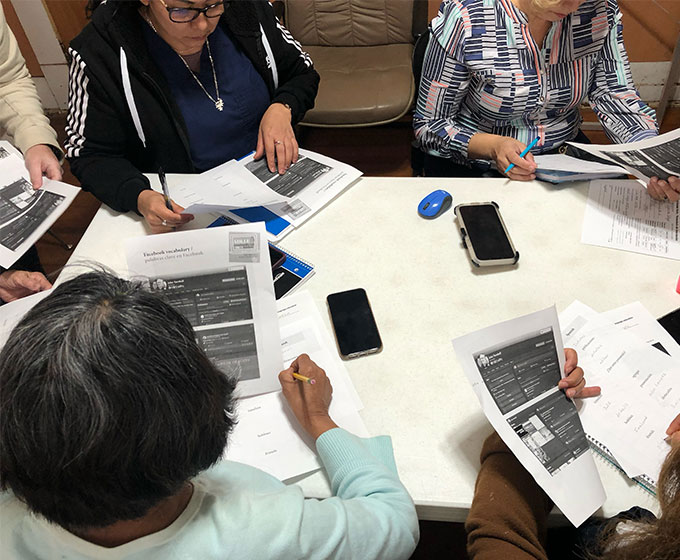
The UTSA College of Education and Human Development and San Antonio Time Dollar are addressing the digital divide in the Westside community. Photo by Sidury Christiansen.
MARCH 18, 2022 — San Antonio Westside residents have a new resource to connect with the digital world. The UTSA Adult Digital Literacy through Language Education (ADLLE) Community Lab has teamed up with San Antonio Time Dollar, a nonprofit community development organization, to provide new programs and services to the Westside community.
Time Dollar will serve as the location for the lab, which aims to help adults become digitally literate and to strengthen their language skills. As part of its continued commitment to shape educational, economic and cultural programs and services for individuals living and working on the Westside, UTSA will provide the education, with a handful of master’s and Ph.D. students providing instruction and onsite supervision.
The ADLLE lab was made possible by seed funding from the UTSA Westside Community Center, which is dedicated to creating pathways to economic prosperity in underserved areas and to providing educational excellence.
M. Sidury Christiansen, an associate professor in the College of Education and Human Development (COEHD), heads up the lab and hopes to make its services as accessible as possible.
“My goal is to support people who want to learn,” said Christiansen, who is also COEHD’s 2021-2022 Next-Gen Provost for Academic Innovation. “There is a great need for resources to help the population that are eager to learn and connect to the digital world.”
Christiansen describes digital literacy as “an emergent form of literacy practice that encompasses the ability to draw on different technology resources to find, evaluate, interpret, research, analyze and produce information critically, as well as to clearly communicate information through written and spoken language and other media on various digital platforms.”
COVID-19 prompted many people to move their lives to online programs, and highlighted just how difficult life can be for those who lacked digital resources—especially non-English speakers.
The ADLLE Lab will provide UTSA researchers with the opportunity to gauge the efficacy of this program and to examine other issues, such as identity and belonging to the community.
Christiansen also aims to bridge the digital divide between those who have access and knowledge of technology and those who don’t.
“This is especially true in the Westside community, which boasts many linguistic varieties of Spanish that students—English and Spanish speakers alike—may be unfamiliar with,” she said.
The benefits are both personal and academic for students in both the Ph.D. and master’s degree programs,” Christiansen continued.
The benefits include keeping educators in the Ph.D. program in touch with the community, while providing master’s students invaluable teaching experience—making this program a “win-win for both community members and the students who work here.”
Christiansen believes digital literacy involves teaching people of all ages how to use the technology but, more importantly, how to think critically about consuming and producing information within it.
“Digital literacy and language education has never been integrated for research; not many are studying it because hardly anyone does it,” she explained.
Currently, there are many programs devoted to either adult language education or digital literacy. The key to her project, however, is the combination of the two, Christiansen said.
“When people do outreach programs, they either teach digital literacy or they teach English as a second language, so they see those as two separate things,” Christiansen said. “Language now is not separated from digital means; we communicate with and through technology.”
UTSA Today is produced by University Communications and Marketing, the official news source of The University of Texas at San Antonio. Send your feedback to news@utsa.edu. Keep up-to-date on UTSA news by visiting UTSA Today. Connect with UTSA online at Facebook, Twitter, Youtube and Instagram.
Move In To COLFA is strongly recommended for new students in COLFA. It gives you the chance to learn about the Student Success Center, campus resources and meet new friends!
Academic Classroom: Lecture Hall (MH 2.01.10,) McKinney Humanities BldgWe invite you to join us for Birds Up! Downtown, an exciting welcome back event designed to connect students with the different departments at the Downtown Campus. Students will have the opportunity to learn about some of the departments on campus, gain access to different resources, and collect some giveaways!
Bill Miller PlazaCome and celebrate this year's homecoming at the Downtown Campus with food, games, giveaways, music, and more. We look forward to seeing your Roadrunner Spirit!
Bill Miller PlazaThe University of Texas at San Antonio is dedicated to the advancement of knowledge through research and discovery, teaching and learning, community engagement and public service. As an institution of access and excellence, UTSA embraces multicultural traditions and serves as a center for intellectual and creative resources as well as a catalyst for socioeconomic development and the commercialization of intellectual property - for Texas, the nation and the world.
To be a premier public research university, providing access to educational excellence and preparing citizen leaders for the global environment.
We encourage an environment of dialogue and discovery, where integrity, excellence, respect, collaboration and innovation are fostered.